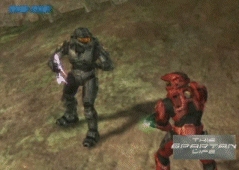Better yet is the intelligent discussion about the promises and challenges of new media. Here's a typical quote from the Bob Stein episode:
Imagine a company's manifesto written today and fast forward 150 years since it was written. You would have not just the 50-page essay, you'd have the comments of millions of people who would not only say 'yea' or 'nay' about various points, but they'd make links to other arguments etcetera, etcetera -- you know every few years, the authors -- Marks and Engles -- might come around and they might actually look at everything everyone had said and reissue a new version so that after 150 years you have a corpus that's literally millions of pages. So the problem becomes how does an editor make navigating through such a large data space useful?
All this and the Solid Gold Elite Dancers? Awesome.
Tune in and get fragged.

Screencap from thisspartanlife.com


